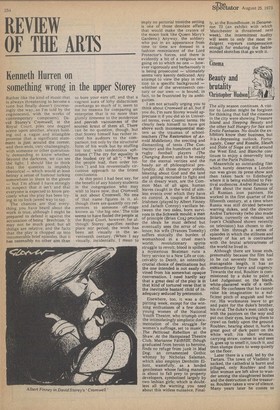Kenneth Hurren on
something wrong in the upper Storey
Rather like the kind of music that is always threatening to become a tune but finally doesn't (increasingly the way, so I'm told by the cognoscenti, with the works of contemporary composers), David Storey's Cromwell, at the Royal Court, piles one dogged scene upon another, always holding out a vague and intangible promise that a significant statement is just around the corner, and then ends, very challengingly, with someone or other querulously demanding to know whether, beyond the darkness, we can see the light, I should like to think that the question is impishly rhetorical — which would at least betray a sense of humour lurking somewhere in there in the gloom — but I'm afraid I have strongly to suspect that it isn't and that everyone is expected to know precisely what the play has been trying in its lock-jawed way to say. The chances are that everything you have heard about the work is true, although I might be prepared to defend it against the accusation of being ' Brechtian.' It may not be much good, but all things are relative, and the facts that the play is chopped up into innumerable brief episodes, that it has ostensibly no other aim than to bore your ears off, and that a vagrant aura of lofty didacticism overhangs so much of it, seem to me no reasons for comparing an enterprise that is no more than glumly tiresome to the ponderous and peevish vacousness of the sourest kraut of them all., There can be no question, though, but that Storey himself has rather incited his auditors to the comparison, not only by the structural form of his work but by stuffing his text with tendentious aphorisms (" The cry for equality is the loudest cry of all "; "When the people lead, then order follows ") and his reverentially circuitous approach to the tritest conclusions.
At this point I had best say, for the benefit of any history students in the congregation who may wish to leave now, that Cromwell is not about Cromwell. No one of that name figures in it, although there are quaintly coy references to someone off-stage known as the big one.' The title seems to have fooled the people at the Royal Court, however, for although Storey specifies neither place nor period, the work has been set visually in the se-. venteenth century. (When I say visually, incidentally, I mean to imply no pictorial treat:the setting is one of those desolate affairs that would make the craters of the moon look like Queen Mary's Gardens.) Anyway, the soldiery who put in an appearance from time to time are dressed in a fashion reminiscent of the Lord Protector's forces, and there is evidently a bit of a religious war going on to which no one — however vigorously and barbarously it is being prosecuted — ultimately seems very keenly dedicated. Any attempt to view the play in relation to a specific background — whether of the seventeenth century or our own — is bound, in fact, to be frustrated by its ambiguities.
I am not actually urging you to think about Cromwell at all, but if you do, I'm sure Storey would appreciate it if you did so in Universal terms, even Cosmic terms. He clearly feels himself to have got above such inconsequential matters as the traumas of schoolteachers (The Restoration of Arnold Middleton), the erecting and dismantling of tents (The Contractor) and the humdrum chat of rugby football players (The Changing Room) and to be ready for the eternal verities and the heady air of philosophical profundity. All those dreary yokels, bleating about God and the land and getting recruited to fight and die in dreary wars, are the Common Man of all ages, human leaves caught in the wind of aimless events over which they have no control. A couple of feckless Irishmen (played by Albert Finney and Jarlath Conroy) vacillate between the two sides, born survivors in the Schweik mould; a man of principle (Brian Cox.) proclaims the ideals he must defend but eventually sees the error of violence; his wife (Frances Tomelty) suffers stoically the burden of womanhood in a cruel man's
world; revolutionary spirits struggle to revolt; blood is spilled; a mysterious Boatman runs a ferry service to a New Life or conceivably to Death, an ostensibly crucial choice of destinations but the one intended is not easily divined from his somewhat opaque conversation. I need hardly say that a great deal of the play is in that kind of tortured verse that is the inevitable bastard child of inadequacy seduced by pretension.
Elsewhere, too, it was a dispiriting week, except for the winning enthusiasm of a few dozen young women of the National Youth Theatre, who triumph over the intimidatingly simplistic documentation of the struggle for women's suffrage, set to music in The Petticoat Rebellion at the Shaw. At the Hampstead Theatre Club, Marianne "Fdithfulr, thOugh graduated from heroin to heroine, finds no refuge from junk in Mad Dog, an ornamented Gothic whimsy by Nicholas Salaman, which also employs Denholm Elliott, wastefully, as a landed • gentleman whose fading mansion is about to fall prey to property developers, symbolised largely by two lesbian girls; which is doubtless all the warning you need about this witless nuisance. Final
ly, at the Roundhouse, in Decameron 73 (an exhibit with which Manchester is threatened next week), the intermittent nudity will seem to only the most indulgent voyeurs compensation enough for enduring the feebleminded sketches that go with it.


































 Previous page
Previous page